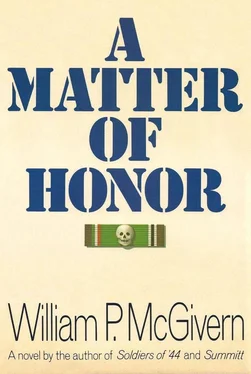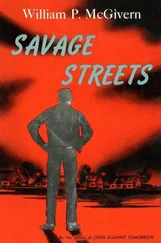At the end of the day he decided to do what he always did after work. He waited until the last employee left, then closed himself in the small, grimy lavatory at the back of the garage and worked with cold water and pumice soap until the last grease was scrubbed from his hands. Then he splashed his face under the tap, ran a pocket comb through his thick, dark hair and drove for a beer in a place he liked outside Calumet City. It was near U.S. 94 off Sibley Boulevard, not far from the truck station where Lasari worked with the boss, two other mechanics and a cleanup man, Luis Carlos.
The Alpine House was an old-fashioned bar, dark and clean, windows boarded over with plywood, painted with scenes of lakes and ducks on the wing, and there was a small, slatted dance floor rolled up in one corner, ready for Saturday night.
Lasari stood at the bar and ordered a beer. The bartender served him and said, “I think a couple of pals were in looking for you this afternoon, George; said they owed you some money.”
“Somebody asked for me?” Lasari said.
“Well, not exactly. Two guys said they were looking for a dago stud who had a souped-up car. No names. I just thought they meant you.” The man wiped at the bar with a clean towel. “If they were regulars, they’d know we don’t stand for that dago talk in here...”
“That’s all right, friend,” Lasari said. “They couldn’t have meant me anyway. No one owes me anything.”
Lasari took a stool at the far end of the bar and drank his beer slowly. All in one day, a suspicious car, a stranger making no sense about the garage phone and now someone asking around the Alpine about an Italian in a souped-up auto. Coincidence, it probably meant nothing, he thought, no need to panic, to turn paranoid and run.
But in his heart Lasari realized why he had taken a stool at the end of the bar. It was beyond the colored lights of the big juke box, almost in shadows, and the position gave him a good view of the door near the men’s room, the one that opened out on the alley.
It was cold and rainy when he left the Alpine. Sibley Boulevard looked like a patch of silver, the pavements freezing over and picking up the reflections of neon from gas stations, and a few dim lights glowing from wire-meshed shop windows.
Lasari ate dinner at a bar and grill a few miles from town, almost on the Indiana state line, crowded with mill workers drinking whiskey with their beers; men alone for the most part, watching the basketball game on TV, and single women sitting cross-legged on the bar stools, their faces illusive and fragile in the flickering light from the overhead screen.
Lasari had been here a few times before and the waitress was a new one, efficient but impersonal. He had watched the flow of traffic behind him all the way from Sibley Boulevard, seeing nothing but trucks headed for the Indiana border and the usual commuters. He ordered the Tex-Mex special with beans and rice, finished the platter slowly, then asked for pie and a second beer and lingered over that. He tried to relax, to make himself feel he was alone and unnoticed, but his right leg began to bother him and he reached down to massage the muscles and scar tissue, first the thigh and then the calf, trying to work away the knots of tension that always tightened when he was anxious. The doctors at Fitzsimons Medical had tried to tell him he’d forget the scars, that they’d get to be a natural part of his body, but they hadn’t.
At the rooming house Mrs. Swade and Karen sat in a small living room off the front hall watching television. The older woman glanced up and waved but her daughter didn’t take her eyes from the set.
“It could turn to sleet outside,” Lasari said. “Driving will be rough later.”
“Thank the Lord we’re in for the night,” Mrs. Swade said. She was a woman in her forties, thin with brightly hennaed hair and a sallow face untouched by makeup. She was bundled up in two sweaters against the chill and wore fleece-lined slippers over a pair of white wool gym socks. A glass of vodka and ginger ale sat on the floor near her chair.
“You do okay on that biology exam today, Karen?” Lasari asked.
“I did all right, I guess,” the girl said without turning. Lasari stood in the doorway, puzzled by the fourteen-year-old’s passivity. Usually she had something to tell him or show him, excited and flirtatious with his dark, male presence in the house, chattering up at him as he went to his room, standing at the foot with a hand on the balustrade. Always at the foot of the stairs. Mrs. Swade was strict about that, never allowing her daughter to go to the second floor, even to deliver bath towels or clean up after the boarders.
Lasari went to his bedroom and changed into fresh jeans and an old flannel shirt, without turning on the lights. In the illumination from the hallway the room was large and impersonal, without human touches except for a blue and gold baseball cap with a weathered sun peak which hung from the footboard of a heavy oak bed. Duro Lasari could have packed and left that room in ten minutes, without a trace to suggest he’d lived there; no forgotten packet of letters tucked at the back of a shelf, no faded patches on the plaid wallpaper to suggest that family snapshots, class pictures or a school diploma had ever hung there.
Lasari stood beside his window in the darkness and studied what he could see of the street, black trees, muted yellow house lights, a few parked cars, rain slanting in thin, silver lines. Carefully he raised the window and listened. He heard a plane, somewhere over Gary or Hammond, coming in toward Chicago. A series of bright red flares, chemical expulsions from mill chimneys, spread on the horizon and something new mingled with the rain. A wind gusting in burned his eyes like acid. Among the parked cars he could make out, none looked like a gray sedan.
Lasari turned from the window and in the dim light from the hallway caught a quick glimpse of his own reflection in the mirror above the chest of drawers, a ghostly focus, narrow face, shiny black hair and a look of alert suspicion in the eyes — an unnerving experience, spying on himself in the act of spying.
A psychotherapist at Fitzsimons Medical, the third week he’d shipped in, had asked him to write down the ten worst things he’d seen during his tour of duty in Vietnam. Lasari tried to think, to remember other things, but he knew that the single thing that had baffled and terrified him most was the look of disbelief and horror in his own face and eyes in those years.
Lasari had scrawled on the doctor’s pad ten times, numbering each word from one to ten: 1. Me... 2. Me... 3. Me... 4. Me... 5. Me... 6. Me... 7. Me... 8. Me... 9. Me... 10. Me...
Long after his wounds were healed, Lasari wondered if he still carried a premature scent of death with him. Sometimes, like tonight, when he could catch an almost palpable whiff of his past, and see the furtive look of fear in his own eyes, he knew what feelings were buried in the depths of his soul.
Downstairs the television set was droning. Across the hall, Luis Carlos’ door was open and the old man was waiting at a card table with the checkerboard set out and a bottle of banana wine beside it. Lasari joined him and saw down on one side of the checkerboard.
Luis Carlos was in his early seventies, tall and lean with a face as brown and folded with wrinkles as the underside of a mushroom. The old man’s English was limited but his eyes were warm and responsive, and his unquestioning calm had made Duro Lasari talk to him over the past two years more freely than he had ever talked to anyone in his life.
The old man looked at him now and said, “You got troubles?”
“You know me, Luis,” Lasari said. “You know me through and through. Listen, I’ve got reason to think somebody’s out looking for me. I’d almost quit running, you know that. Last night I went to that Veterans office and now... well, I can’t be sure.”
Читать дальше












